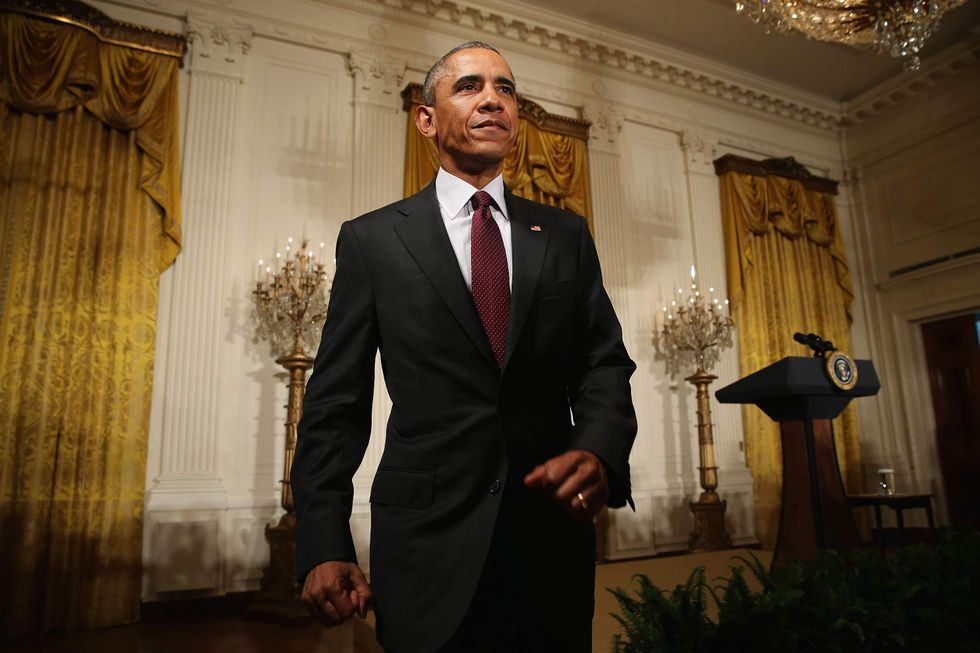
New documents reveal Democratic senators urged then-President Barack Obama to take action against Russia for election meddling in Nov. 2016. (Chip Somodevilla/Getty Images)

New documents revealed Friday that former President Barack Obama was urged by Democratic senators in late 2016 to take action against Russia for their apparent cyber meddling in the 2016 election, but failed to do so for weeks.
According to documents obtained by Operation 45, a pro-government transparency organization, Democratic Sens. Diane Feinstein (Calif.) and Ben Cardin (Md.) wrote to then-President Obama in Nov. 2016 urging him to take action against Russia for alleged election meddling.
"We are writing to urge a direct and proportionate response to the Russian Federation’s state-sponsored cyberattacks on the United States’ democratic institutions and the 2016 electoral process. Such attacks cannot be tolerated and the United States must take immediate measures to ensure that those responsible are held to account," they wrote in a letter to Obama on Nov. 1.
The letter was released last Wednesday after Operation 45 submitted a Freedom of Information Act request.
The letter states that the Department of Homeland Security and the director of national intelligence became certain by Oct. 7 that Russian officials were behind the explosive document dumps by WikiLeaks that plagued Hillary Clinton's presidential campaign and the Democratic National Committee.
According to the letter, only the most senior Russian officials could have orchestrated the cyber meddling.
In response to the attack, Feinstein and Cardin wrote that the U.S. must act.
"A cyberattack on our electoral process or any part of our critical political, economic, or military infrastructure is a hostile action that must be countered," they wrote.
The duo then suggested three courses of action: First, the duo urged the president to freeze the assets of those involved in the cyberattack. Second, they wrote that the U.S. should expand sanctions against Russia and finally they said the U.S. "should consider taking proportional cyber responses beyond sanctions that would shine a direct spotlight on those responsible for the cyberattacks."
"The United States should make clear that there are costs to engaging in these sorts of cyberattacks, whether by Russia or any other actor," they wrote.
It's not clear what immediate actions Obama's administration took in response to being pressed by members of Congress. However, the response the administration sent to Feinstein and Cardin may shine a light on how seriously the administration was or wasn't taking the threat from Russia.
Julia Frifield, then the assistant secretary of state for legislative affairs, replied to both senators individually with the same response, telling them in part that the administration "shared" their concerns and had raised those concerns directly with the Russian government.
Frifield, in a short response letter, went on to reiterate the Obama administration's policy toward cyber warfare.
"As we have made clear to the Russian government and others, we will not tolerate attempts to interfere with the U.S. Democratic process, and we will take action to protect our interests, including in cyberspace, and we will do so at a time and place of our choosing," Frifield wrote on Obama's behalf.
Frifield did not respond directly to suggestions that Feinstein and Cardin urged the administration to take.
It wasn't until more than a month later that Obama would publicly order a full investigation into allegations that Russia meddled in the election. And it wasn't until almost two months after Obama received the senators' letter that he announced increased sanctions against Russia over the allegations.
Those two actions came at a time when the mainstream media was already grilling then-President-elect Trump, his campaign and transition team for alleged ties to Russia, despite the FBI saying in October that they had found zero evidence of ties between Trump's campaign and Russia.
But in recent days, more officials are beginning to speak out about how the Obama administration likely dropped the ball on Russia.
Mike Morrell, who served as CIA director under Obama, said Sunday that Obama "failed miserably" in his response to Russia during an appearance on CBS "Face the Nation."
Then Rep. Adam Schiff (D-Calif.), a top congressional Democrat, said Sunday it was a "very serious mistake" on Obama's part to not take action against Russia earlier than he did. Schiff made his comments during an appearance on CNN's "State of the Union."
Chris Enloe
Staff Writer